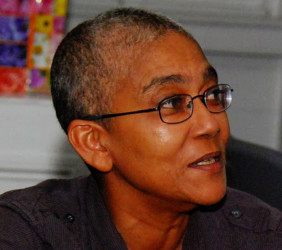While declaring the local media environment to be “chaotic,” human rights activist Karen de Souza says more needs to be done to tackle issues such as women and gender inequality and to examine policies and practices.
de Souza, coordinator for Red Thread, which advocates for the rights of women and children, said last week that there was “… not too much investigation, not too much responsibility for what is printed or what is said on the television,” She was at the time delivering a presentation, ‘Reporting on Family and Gender Issues – An NGO Perspective,’ last week in Barbados, as part of an Improved Access to Justice (IMPACT) seminar.
de Souza lamented the poor quality work and lack of specialisation by media workers, especially in gender inequality issues.

She explained that while her presentation on media and law in the context of her topic was problematic, both together and separately, she was focused on speaking from a consumer vantage point.
de Souza said that she still feels enough is not being done to tackle women and gender inequality issues through media reportage and that she did not have enough time in her presentation to delve into the deeper context of explaining and garnering recommendations or crafting policies to help in this regard.
As a result, at the end of the seminar Regional Project Director of IMPACT Professor Velma Newton announced that there will be a follow-up session to tackle gender inequality issues.
Even as she acknowledged that the media environment was highly competitive among the several radio and TV stations and three major newspapers, de Souza stressed that they are themselves staffed by inexperienced reporters. “It seems to me that… there is pretty high turnover of media operatives and I heard people speaking about A level and into the newsroom, but we now have CXC and into the newsroom and CXC doesn’t guarantee that your subjects and verbs agree,” she said.
de Souza also criticised what she regarded as the Guyana Press Association’s limited advocacy and involvement in dealing with various issues being addressed by civil society. “In terms of the activity of the Guyana Press Association… the only time I hear about them is when they are organising elections training. So they just had a local government elections training, they issued some statements. In fact, you know the most exercises I have seen the press association in, over the years, is when a journalist was threatened. When civil society invites them to something, they don’t come. They would come to cover something but as participants, no, not interested,” she said.
de Souza also suggested that the media, whom she referred to as “not the most forward thinking people, necessarily,” has been engaged in self-censorship due to fear of litigation.
“I say the media is not necessarily the most progressive in Guyana… because the threat of libel suits has, I believe, caused media houses to become very conservative on matters,” she said.
Pointing to Guyana’s Sexual Offences Act and how it affects media here, she credited the law for its protection of victims’ identities, particularly children, from the media given that in Guyana communities are small and victims can be traced easily.
As it relates to Guyana’s Protection of Children Act, de Souza said that while it should be hailed for also protecting children’s identities from the media, there is not enough done to hit the core social issues facing some of the country’s children. “Children are picked up for wandering… and you would probably get a report from the press that says, ‘So many children picked up for wandering’ and I must tell you those children are sent off to the New Opportunity Corps. You don’t get, ‘These are the things that are happening in this child’s life and these are the things the state has to do, instead of sending the child to prison,’ which is what New Opportunity Corps is,” she stressed.
“We culturally want to hold on to the notion of good children and bad children. What we would want from the media is a lot more work in terms of these, challenging the issues,” she added.
Overall, she said, more probity is needed from the media. “Our media doesn’t seem to have the capacity to dig into… there hasn’t been enough digging or pushing,” she said.





